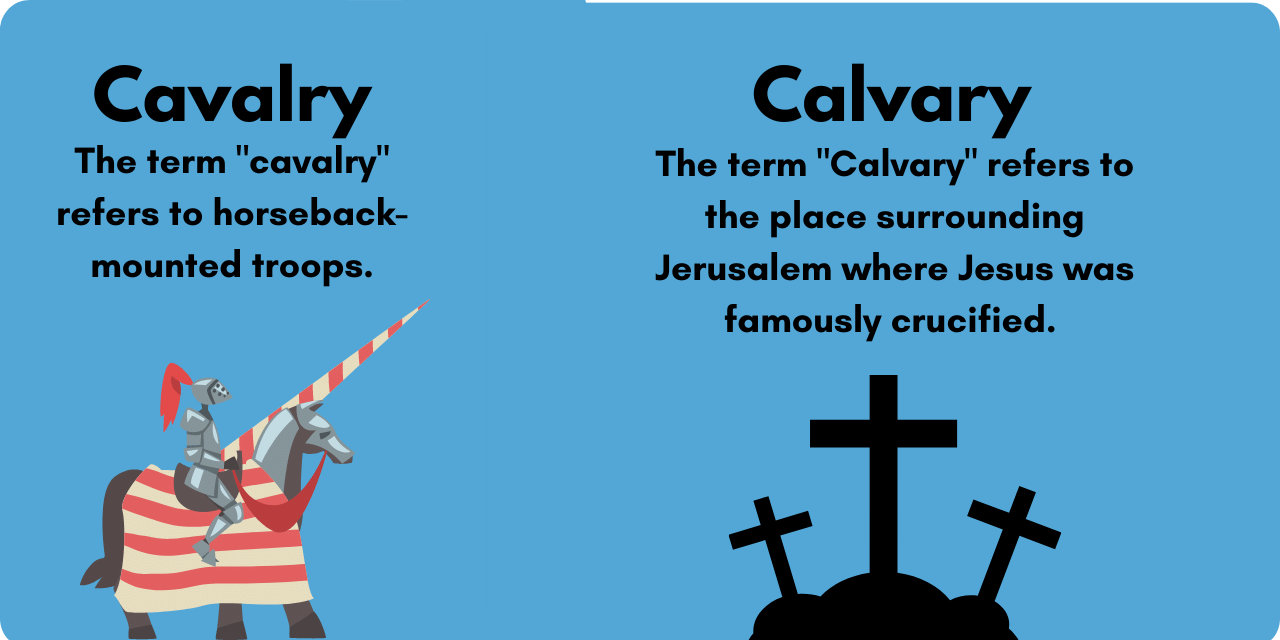Let’s have a look at a confusing pair of words: cavalry vs. calvary. First the quick answer:
- Cavalry refers to horseback mounted troops
- Calvary describes the place surrounding Jerusalem where Jesus Christ was famously crucified
Now let’s look under the hood.
You may have seen these in The Wall Street Journal, Washington Post, or New York Times, but although they may sound very similar and are spelled almost the same, don’t be fooled. These two words are so vastly different that interchanging them would completely change the meaning of your sentence.
As mentioned, one of the reasons why these two words are confused is due to their similar spelling. Additionally, due to their spelling, these words have extremely similar pronunciations. Unfortunately, they are not synonyms (words meaning the same thing), but only anagrams of each other (words that have the same letters).
If you’re confused about the word cavalry compared to the word calvary, let’s get into what they mean and how you can use them in your writing without any further ado!
What Do “Cavalry” and “Calvary” Mean?
To get to the point, “cavalry” is the correct word you probably intend to use in most of your writing. The word refers to “horseback-mounted troops” with the plural cavalries. In a more everyday sense, it can also simply describe citizens of support who are metaphorically coming to help.
To distinguish the word pairing, take these sentences as the first examples of calvary in the most common meaning for English speakers (of troops or support):
-
We led the air cavalry charge against the Soviets with planes, jets, and stealth bombers.
-
Since then, he’s donned a fair bit of knightly armour, and found his cavalry racing over the hills.—The Guardian
-
When the first attack failed that day, Tom was ordered to march his men on foot—despite the fact that they were cavalry soldiers with no experience of fighting on the ground— across a dried salt lake.—The Guardian
In contrast, “Calvary” usually describes the place surrounding Jerusalem where Jesus Christ was famously crucified—Calvary Hill being the site of Jesus’ crucifixion. In a more figurative sense, it may also be used to describe an experience of intense mental suffering.
Take these example sentences in contrast to the previous meaning of military infantry. Some describe a religious connotation, and others are more figurative about the suffering of the situation:
- All land was owned by the sultan God’s representative on earth but it was leased out to spahis (calvary corps members), who in return undertook to provide troops in proportion to the amount of land held.—Encyclopedia Brittanica
- The human difficulty in attaining and sustaining canine happiness arouses an emotion close to pity, described as “a horror, an authentic horror at the unending calvary that is man’s existence.”—The New Yorker
- Garibaldi suffered enormously for the Italian cause but his tribulations were also heavily spun he had to incarnate the nation’s “romantic agony”, not just his own personal Calvary.—The Economist

How Did “Cavalry” and “Calvary” Originate?
Etymologies can help you distinguish between a common word and the name of the hill where Christ was crucified.
Cavalry (describing valiant soldiers) originally came from the Italian term “cavalleria.” Depending on what sources you are using, the Italian word either refers to chivalry or cavalry, related to what is cavalier. Obviously, chivalry has nothing to do with a hillside or the Calvary Baptist Church. Throughout time, the word strengthened and was adapted to the modern form we see today.
In comparison, “calvary” stems back to the Bible, as it was where Jesus was crucified. More literally, the term comes from the Latin word “calvaria,” which means skull. As mentioned, over time, it took on a meaning more metaphorically, simply referring to emotions and feelings.
Clearing the Confusion of Cavalry vs. Calvary
In truth, you would rarely intend to use the proper noun “Calvary” unless you were actually referring to the crucifixion of Jesus or ancient Jerusalem. Rather, as a common noun (in the lowercase) you would use the term to indicate your suffering in a situation—but even then your usage would be limited.
Rather, with grammar tips coming to the rescue, you are likely intending to use the word cavalry which has a similar, but significantly different correct pronunciation with the “v” sound before the “l” sound.
If you’re still drawing a blank, a trick to remember the difference between Calvary and cavalry (one of any grammarian’s pet peeves) is to say the “LV” version stands for “Leviticus” and putting the “V” first is “very important.” (In the most common and ordinary usage, the “L” will always come in the second syllable.)
Try not to switch up the sounds. There is perhaps no better example of the phenomenon called “metathesis” (where sounds easily get mixed up in speaking) as these two words.
Whether you’re on the battlefield, a mission, or simply writing about support, let this discussion clarify when to use cavalry (and when to notice Calvary being used metaphorically).






